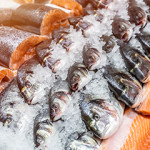Thai Union asks industry and peers to join in on aggressive sustainability commitments

The world’s oceans are under constant pressure from a litany of threats – climate change, pollution, and acidification – yet international organizations are not prioritizing funding to address those issues.
Despite the many challenges facing the oceans, the United Nations’ Sustainable Development Goal (SDG) for “Life below Water” (SDG 14) remains the least funded of the 17 categories, according to United Nations Secretary-General António Guterres. With international funding lagging, it’s up to seafood companies to step in and provide the initiative and financial backing to achieve real change and ensure healthy and thriving waters worldwide, Thai Union Group said.
This summer, Thai Union launched its most ambitious sustainability commitments so far: SeaChange 2030. The program is the next stage in the group’s strategy to help reshape the seafood industry around sustainable practices, and it’s dedicating real financial resources to the project. The enterprise has committed USD 200 million (EUR 184 million) – the equivalent of its entire net profit in 2022 – to SeaChange 2030.
Thai Union has made three marquee commitments as part of the program:
- Path to net zero emissions: A 42 percent reduction to Scope 1,2, and 3 greenhouse gas emissions by 2030, and net zero emissions by 2050.
- Responsible wild-caught seafood: 100 percent of the group’s wild-caught seafood will be produced responsibly and managed within biologically sustainable levels or engaged in an improvement program, while 100 percent of vessels that it sources from are implementing best practices to prevent illegal, unreported, and unregulated (IUU) fishing and modern-day slavery.
- Responsible aquaculture: 100 percent of its shrimp will be produced minimizing ecosystem impact and meeting current industry best practices in welfare and working conditions.
The company has outlined eight other interconnected goals for SeaChange 2030, including ecosystem restoration; responsible agriculture; best-in-class manufacturing; safe, decent, and equitable work; ocean plastics reduction; nutrition and health; sustainable packaging; and corporate citizenship. All eleven commitments actively support SDG 14 (Life below water) and nine other SDGs.
The SeaChange 2030 strategy is a continuation of the work already underway as part of Thai Union’s SeaChange sustainability program, which launched in 2016. Last year, Thai Union reduced its Scope 1 and 2 greenhouse gases by 7 percent. The company also increased the percentage of tuna it buys from vessels with electronic and human monitoring from 71 percent to 79 percent in 2022.
Thai Union has invested USD 100 million (EUR 92 million) into SeaChange to date since 2016.
“Working with Thai Union enables customers to meet their own sustainability targets via a transparent and accountable supply chain,” Thai Union Chief Sustainability Officer Adam Brennan explained.
In 2022, Thai Union joined forces with the Sustainable Fisheries Partnership (SFP) to improve transparency. SFP’s Seafood Metrics system gave Thai Union more insights into its global supply chain, and the group utilized SFP’s Ocean Disclosure Project to reveal its wild-caught and farmed seafood sources so partners and NGOs can hold the group accountable.
In addition to its work with SFP, Thai Union has partnered with other major players striving for global sustainability across the world’s oceans, including the Aquaculture Stewardship Council (ASC), The Nature Conservancy, IDH – the Sustainable Trade Initiative, and The Global Ghost Gear Initiative.
Thai Union let the Science Based Targets Initiative (SBTi) verify and approve its short- and long-term sustainability goals in June, being the first seafood company to do so. SBTi is a partnership between several environmental groups that independently assesses corporations’ efforts to reduce greenhouse gas emissions. The company published its second Task Force on Climate-related Financial Disclosures (TCFD) report in August, which provides a look into how Thai Union “identifies, manages, and responds to the financial challenges and opportunities posed by climate change,” the firm said.
 Part of the company’s sustainability priorities is ensuring that it provides a safe and equitable workplace. In 2022, Thai Union conducted the first ever at-sea audit to assess the working conditions faced by crews on longline vessels, ensuring human welfare in a sector challenged by labor abuse. Even though the group does not have vessels of its own, it is committed to making sure the vessels it works with are helping prevent IUU fishing and modern slavery. That commitment to safe and decent employment is not limited to at-sea fishing, either – Thai Union’s goal is for all the aquaculture farms it sources from to engage in best labor practices as well. Thai Union will be one of the first seafood processors setting up an ASC-led Aquaculture Improvement Project = which aims to bring more than 4,000 metric tons of shrimp up to ASC certification. The group will also implement best practices in line with the social and water quality requirements of the ASC standards on another 11,700 metric tons.
Part of the company’s sustainability priorities is ensuring that it provides a safe and equitable workplace. In 2022, Thai Union conducted the first ever at-sea audit to assess the working conditions faced by crews on longline vessels, ensuring human welfare in a sector challenged by labor abuse. Even though the group does not have vessels of its own, it is committed to making sure the vessels it works with are helping prevent IUU fishing and modern slavery. That commitment to safe and decent employment is not limited to at-sea fishing, either – Thai Union’s goal is for all the aquaculture farms it sources from to engage in best labor practices as well. Thai Union will be one of the first seafood processors setting up an ASC-led Aquaculture Improvement Project = which aims to bring more than 4,000 metric tons of shrimp up to ASC certification. The group will also implement best practices in line with the social and water quality requirements of the ASC standards on another 11,700 metric tons.
The group also fully implemented a new Employer Pays Principle, so that no worker pays for a job, and Thai Union is committed to half of its management positions being held by women.
“The seafood industry needs to do more when it comes to caring for our people, our planet and our oceans,” Brennan said. “The time for aggressive action is now. Through SeaChange, we aim to drive meaningful improvements across the entire global seafood industry. Commitments this ambitious require the power and collaboration of communities, governments, and organizations that can help make long overdue structural changes a reality. Together with our partners, we’re asking the wider industry and our peers to join this effort.”
For more information on SeaChange, which is a registered trademark by Thai Union Group PCL, visit the SeaChange 2030 website at https://www.seachangesustainability.org/.





Share